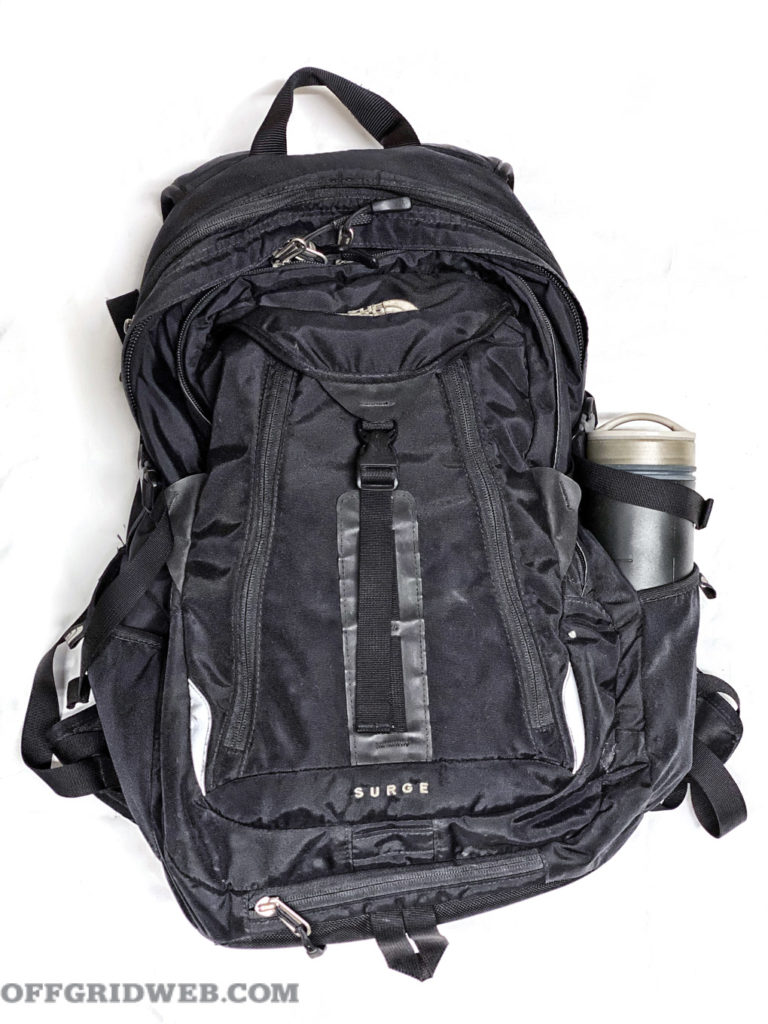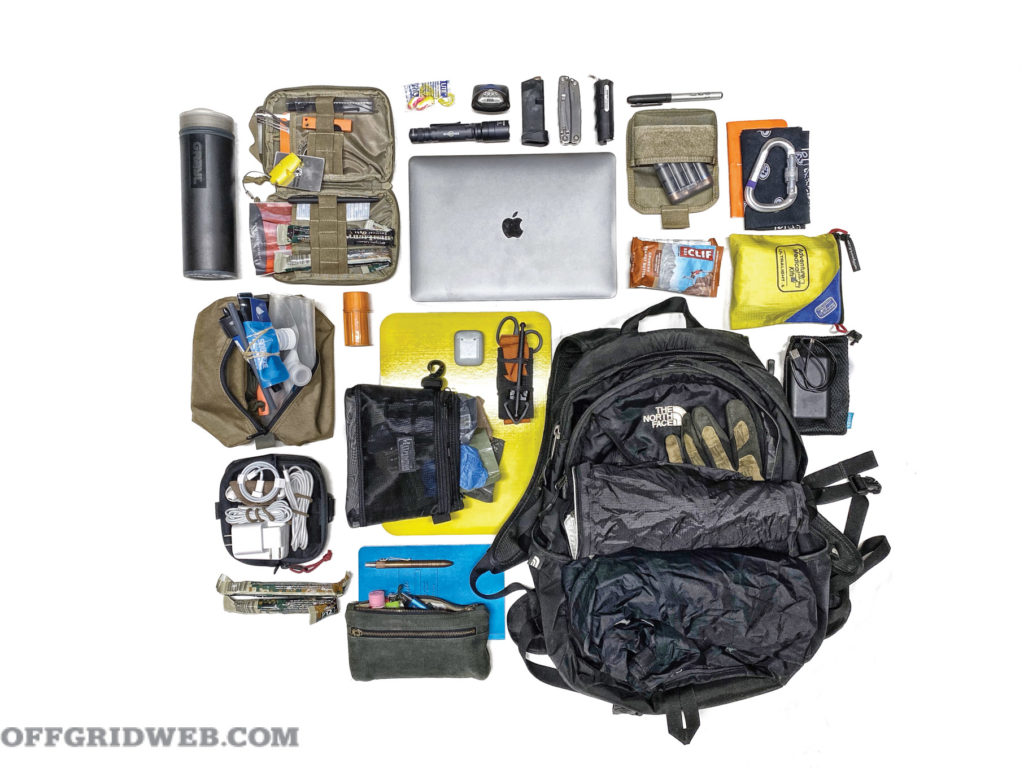RECOIL OFFGRID Gear Gray Man EDC Bag
In This Article
As a federal agent for 12 years, I never knew if I’d be conducting surveillance, responding to a bomb threat, or meeting with a U.S. attorney. Defensive, medical, survival, and day-to-day gear had to be accounted for. My work has now shifted to consulting, but my desire to balance practicality and preparedness hasn’t diminished. The daily result: my Gray Man EDC Bag.
When it comes to an EDC bag, I like something very low key. I want it to be able to blend in regardless of whether I’m at a college campus, urban area, rural area, or airport.
My current go-to bag is a 10-plus-year-old North Face Surge backpack. Weighing in at 3 pounds unloaded, it’s slightly heavier than some alternatives, but the organization and comfort make up for the extra heft.
The capacity is just over 2,000 cubic inches (33L), which is smaller than some of my other bags, but still sufficient. The overall dimensions come in around 20 by 13.5 by 9.5 inches.
I find this EDC bag to be very comfortable under heavy loads, which makes it easy to carry for longer periods of time. It has a waist belt that facilitates carry when on the move, but it can be hidden when not in use. It also has a pretty beefy grab handle, which is important when you have to grab and go.
As part of my job, I spend a lot of time online or on the phone. I need to be connected or have the ability to be connected to get work done while I’m on the move. I do a lot of work on my laptop and also my cell phone. Keeping these devices charged and functional is critical.
In order to support my electronics, there are certain things I need to carry, which include an assortment of cables, an Anker PowerCore 10000 power bank, and a set of AirPods.
I also carry a small canvas zippered bag with other peripheral items like an encrypted thumb drive, adapters, pens, pencils, and Nite Ize Gear Ties to keep small pieces of gear organized. If I need to go analog, a notepad and pocket-sized notebook are in there as well.
When it comes to medical gear, I always carry basic first-aid items. For normal everyday aches, pains, scrapes, and scratches, I carry an Adventure Medical Kits Ultralight .5, which I have supplemented with additional medication and bandages.
If I encounter more serious issues, I always have a tourniquet in my bag (and a second one on my body), as well as hemostatic gauze, chest seals, and so on. These are kept in a Maxpedition Moire pouch and stored for easy access.
When considering carrying medical gear, it’s important to not just focus on shooting-related incidents. You’re significantly more likely to encounter work-related accidents and vehicle-related accidents. Be prepared for all likely scenarios.
In addition to the spare mag I carry on the body, I carry an extra magazine to support my primary carry weapon, in case I need it for an extended fight.

Above: This discontinued version of the Surge pack is more than a decade old, but still going strong.
I also carry a less-lethal option in the form of OC spray. I prefer Sabre Red, and I keep this spare in my EDC bag in case I forget my primary at home. I can grab it quickly and throw it in my pocket if I’m heading out into certain public areas or anywhere else that warrants extra attention.
A SureFire EDCL2-T flashlight is stored as a backup to my primary EDC light. To ensure it always has power, I carry a battery case with extra CR123 batteries.
One of the features I like about the Surge backpack is it has an extra interior compartment/sleeve on the back of the pack. I use it to house a Level 3A Hardwire Bulletproof Bag Insert.
This panel offers IIIA protection and measures 10 by 13 inches. It fits flat against my back and can also double as a dry erase board. This has proven to be an extra benefit several times when meeting with clients or teaching classes.
Like most of you, I store expanded survival kits in my home and my vehicle, so this EDC bag is intended to supplement them. Most, but not all of these items, have multiple purposes, which is always a plus.
I have a pouch made by Tuff Possum Gear that houses fire-starting tools like a Bic butane lighter wrapped in duct tape, an EXOTAC titanLIGHT liquid-fuel lighter, a ferro rod, survival matches, and tinder tabs.
Water peripherals, like the Sawyer Mini Water Filter, are carried in the same pouch as my fire gear. I also have a GRAYL Ultralight Purifier Bottle that’s used as a regular water bottle, but can also provide quick purification when needed. I have a Platypus collapsible water bladder to house purified water or extra water if the situation warrants. It sits with my fire gear and the Sawyer.
There’s also 100 feet of paracord on a spool for those times when I need cordage. Outside of all the survival benefits and uses of paracord, it can be used for a lot of everyday tasks as well. The spool helps keep the cordage neat and organized instead of ending up in a big knot.
Inside you’ll also find a small E&E pouch containing various saws, blades, lock picks, handcuff keys, a signaling mirror, and other extras. You never know when you might lock yourself out of the house.

Above: My EDC bag loadout contains mundane office supplies as well as emergency survival tools.
A pair of waterproof pants and a jacket from Mountain Hardwear are rolled up at the bottom of the main compartment in case I get caught out in a sudden downpour.
In addition to the gear above, I’ve also stashed the following items in various compartments in my pack:
There are more miscellaneous tools stuffed here and there, but you get the gist of the EDC pack. Again, this is mainly for work and daily life, but I feel like there’s a fine line between what’s normal and the next major crisis. Being able to comfortably walk that line and having the ability to move in either direction is paramount.

MSRP: $129
URL: www.thenorthface.com
 STAY SAFE: Download a Free copy of the OFFGRID Outbreak Issue
STAY SAFE: Download a Free copy of the OFFGRID Outbreak Issue
No Comments